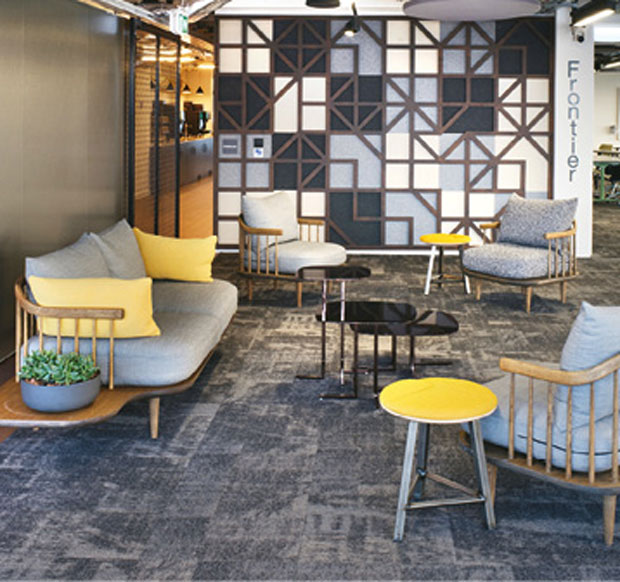NEW DEAL, NEW CHALLENGES
However, it isn’t all straightforward. Noah explains: “Traditionally, people were always meeting either physically or remotely, but rarely the two combined together. Now people flex their days so simple meetings can look very different. We needed to create hybrid spaces that work for both.”
The fast-changing workplace landscape has also meant that those responsible for workplace facilities and culture need to be more agile to cope with the ever-evolving needs of teams.
“We have a continual challenge to help the business understand what it needs and what it wants,” Noah says. “We talk a lot about a ‘living portfolio’ at PwC. Gone are the days where you build a building and expect it to stay that way for X numbers of years. Every progressive organisation will have to regularly evaluate and evolve their workplace environments. We have to do this across our whole estate.”
The evolution of the workplace and its facilities, some could argue, has never been higher on the corporate agenda. Organisations are looking closely at their prime office locations to see how they are able to justify their continuously high spend.
That, coupled with a huge movement towards creating more sustainable environments, means businesses are being more socially conscious, an example of this being the first Net Zero fitting at a newly opened site in Glasgow.
Noah explains: “With an estate the size of ours, we spend a lot of time working out strategies to help us move more towards our own net zero targets. We have a large furniture team that spends a lot of its time ‘lifting’ and ‘shifting’ equipment and furniture across offices. It’s really important that we are constantly looking to see what is and isn’t right for our offices, both commercially and environmentally.”
THE EXPERIENCE
The impact on facilities in PwC buildings has been significant, not just through the consideration of space and equipment, but also the configuration of desks, softer seating and breakout areas.
Employees are moving more towards the use of coffee shops instead of traditional meeting rooms and, clearly, this has an impact on building arrangements with some offices being reconfigured as lounges.
Noah says: “It’s interesting because we’ve seen the replacement of some board room tables with coffee tables. Our workplace experience is becoming more akin to hotels and hotel lobbies.”
The company has also invested in new tech in all its offices, including upgraded audio-visual equipment in over 1,200 meeting rooms, with new wireless video conferencing, speaker and camera tracking, and automatic noise suppression to ensure a better hybrid experience.
This hybrid office offering has had major implications on the work of BaxterStorey, PwC’s catering provider.
Louise Denton, BaxterStorey Account Director at PwC, said: “As soon as the terms of the ‘Deal’ were communicated to us, we knew how important a role we had in helping to reshape workforce behaviours.
“Given all that has taken place over the last few years, the new sense of direction brought about by the new ‘Deal’ really energised employees across the business. As caterers, we could really feel it in the buildings we look after.
“However, this new way of working clearly had an impact on our service offer and we immediately recognised the opportunities to support our colleagues at PwC in creating this new world.
“Food, as we all know, is something that can bring people together. It’s that social glue that binds people. With fewer people having ‘face time’ with one another, we knew that we needed to create memorable experiences when they do.”
And memorable they are.






